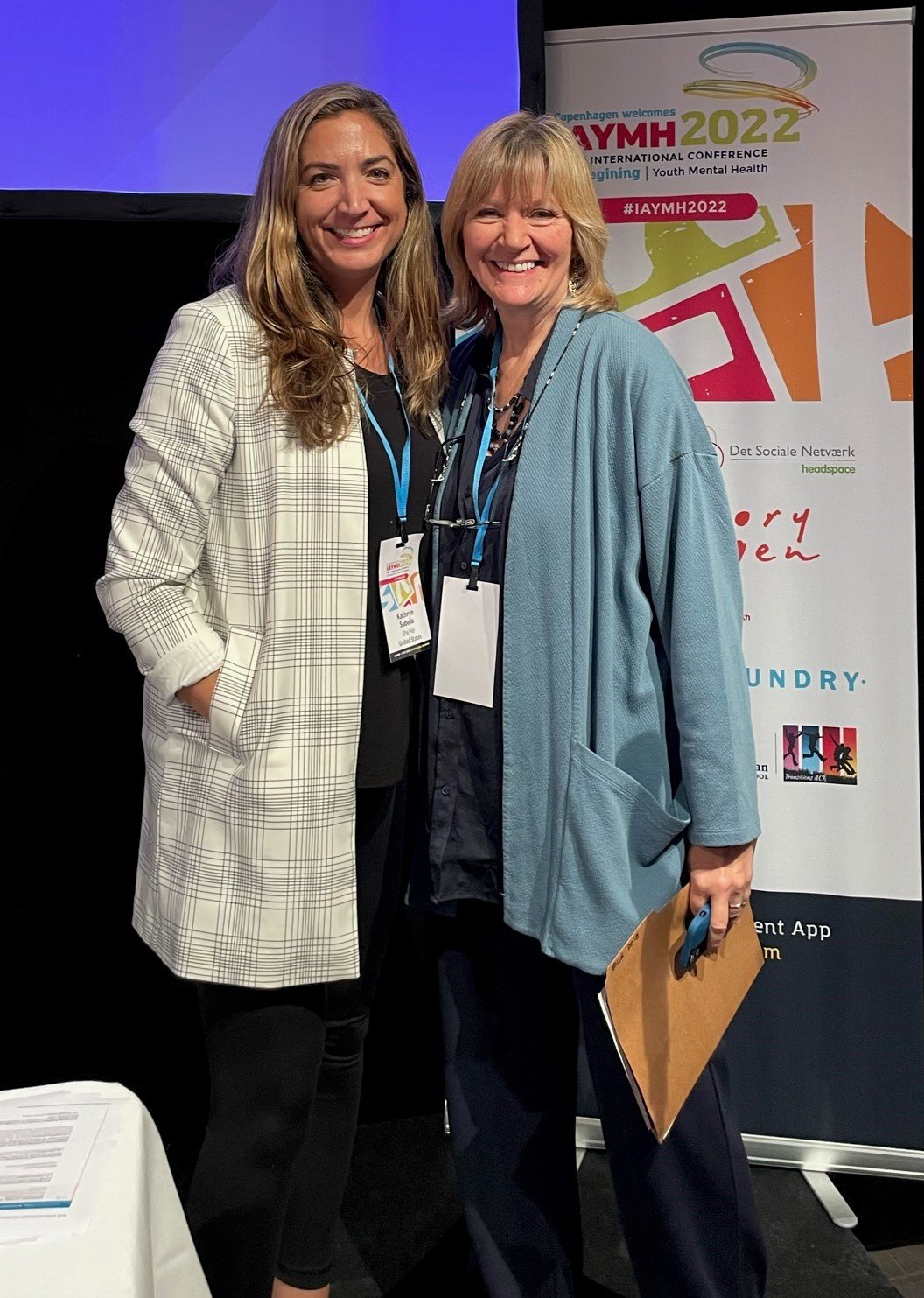Tell us a little about yourself (professionally & personally). What led you to become the center director?
At Work....
I'm Assistant Professor here at UMass Chan Medical School and I've been with the Medical School since January of 2010. Maryann hired me shortly after being awarded the first Rehabilitation Research and Training Center on Learning and Working for Young Adults with Serious Mental Health Conditions. I started out as a staff member as the grant’s Project Director, with the goal of establishing the center and getting it up and running.
Since that time, within the RRTC, I’ve helped develop the Participatory Action Research framework used in the center, was Deputy Director of Operations, and more recently the Deputy Director of Research. Over the years, the research portfolio within iSPARC focused on the transition to adulthood grew, within iSPARC and Maryann established this broader center, The Transitions to Adulthood Center for Research, that encompasses the original RRTC grant but also other projects and faculty.
During this time, I was growing professionally and personally. In 2014, I went back to school to pursue my own PhD. in sociology at the University of Massachusetts Boston and defended my dissertation utilizing a research study in the center. Over the last 5 years or so, I've been developing my own research agenda within the center while still maintaining some of those collaborative titles, across some of the ongoing research.
At Home...
I became a mother to two daughters; one is almost 11 and the other is 7. And they are full of life and spunk and keep me moving. While no longer married to their father, we co-parent really well together and are living a very fulfilling life, even if it looks a little different.
I was born and raised in Connecticut, so a New England girl through and through. My parents now live down on Cape Cod, so, if I'm not working (or driving to and from soccer lacrosse, or dance), I like to be at the beach.
What is one fun fact about you that somebody might not know? Such as what is your favorite podcast/show/book.
I love reading. I read fiction every night before bed, as a way of just kind of unwinding. My favorite shows that I am currently binging would be The Marvelous Mrs. Maisel on Amazon and Tiny Beautiful Things on Hulu.
What's your long-term vision for Transitions ACR? What is your wish/hope for this center three years from now?
I think my goals for the center are not that different than what Maryann has been pursuing.
One...
I want to continually increase our national and international reputation for conducting research, training, and dissemination that can, and does, improve outcomes for young adults with serious mental health conditions. Improving that reputation includes continuing to do innovative research, attracting new faculty members, getting new grants, and building more collaborations.
Two...
I hope to expand our reach through training and dissemination. I want to continue supporting and growing our infrastructure for participatory work and community engagement with both young people with lived experience and families. It’s especially important for us to put some resources towards diversifying the backgrounds and lived experiences that we have represented in our current participatory initiatives.
Three...
I want to increase collaboration and workflow within, and across, the center. Since I joined in 2010, Transitions ACR, now includes multiple grants, multiple center grants, contracts, and other projects. And we all get very busy in our own little silos, so I’m interested in finding ways to cultivate more collaboration and communication across projects. I’d like to develop more processes and procedures pertaining to data management, knowledge translation, and those participatory approaches too; a little increase in synchronicity is a good way to think about it, across and within projects.
That's my platform, so to speak. I think it's just a renewed effort or renewed energy in those areas.
What’s your personal research passion? What brought you to mental health research?
How I Got Here...
I attended Providence College as an undergraduate and I thought I wanted to be a high school English teacher. Very quickly realized I didn't really want to be a teacher, but I was uniquely interested in all the pressures and experiences that I was seeing myself and my friends go through, and the ways in which our social and familial contexts influenced those experiences.
I landed in sociology and became very drawn to the research methods and coursework. Many students do not enjoy the research methods courses and I loved it! From there, I went straight into a master’s program at UMass Boston in Applied Sociology, essentially applied social research. I spent 5 years at Dana Farber Cancer Institute doing really interesting social behavioral research in a clinic for women at a high risk of breast cancer, often due to their familial genetic factors. And I learned so much about managing research studies, and everything it takes to do that.
How I got HERE...
Over those 5 years, the topical area evolved a bit, and it became much more biomedical than I was really interested in or just in a way that didn't fully align with my interests. So, it was through a mentor at UMass Boston that I found and connected with Maryann Davis and her job opening. I was very excited about that; it ended up being the only job I interviewed for. Making that move from Dana Farber to Transitions felt like a natural fit with my passions.
My short elevator pitch is:
Being a young adult is hard enough. Being a young adult in current society has some unique challenges, and then being a young adult with a mental health condition just makes everything that much harder. I think young adulthood is such a time of opportunity, even though it's filled with a bunch of mini and/or real crises. So, I really enjoy this line of work, as it pertains to the unique developmental and cultural phase of young adulthood.
In your opinion, what do you think we could be doing better in mental health research?
Step 1 is More...
There’s been a lot of talk about the mental health crisis in this country, especially among younger adults, for years. I think the first step that's needed is to address that crisis is just more. More resources, more mental health providers, more therapists, and a more diverse workforce. The availability of more services is and has been a primary need for several years. And even though I think many of the existing services can and should be improved, I think more of the same at least is better than nothing.
Step 2 is Improvements and Recognizing Shades of Gray...
Then step 2 would be the improvements needed to the system and policies. And when it comes to young adult mental health, I often say: “You can't have business as usual and expect it to appeal to young adults.”
Even after decades of the work of Maryann and others, our systems still don’t fully recognize young adulthood as a unique developmental period and cultural context. And it's also not a situation of one size fits all. While you can make generalizations about the experience of young adulthood in the United States, we also need to recognize the many shades of gray in the experiences of young people in this country depending on the color of their skin, their sexual or gender identity, their geographic location, and their childhood upbringing and socio-economic status. I don’t think our current system fully recognizes those shades of gray. We need more culturally relevant, outside-the-box, holistic and innovative approaches to supporting the mental health of millions of young adults.
To get there, we need policy priorities and more research. I’m optimistic about the recent Biden-Harris Administration’s Investment Plan to tackle the country’s mental health crisis and hope this leads to some of the systemic change I described above. And from a research perspective, we not only need to develop and adapt interventions for young adults, but we also need research that prioritizes the lived experience of young adults. I don't consider myself an interventionist. I prioritize the exploratory and descriptive research that really elevates the lived experiences of young people in such a way that that information and that knowledge can be turned over to the systems and service providers, to adjust and inform adjustments in their day-to-day practice. Essentially, it’s not a matter of “if you build it, they will come” because ultimately you need to be marketing and tailoring mental health services for young adults and I think we need a bigger research agenda in this country to understand that phenomenon.
Is there anything else you’d like to share?
 Yes, I want to recognize that there's a lot of transition happening within our Transitions Center and within iSPARC. And when I think about the near future during that transition, I see a lot of opportunities. I look forward to working with Megan Kelly in her role as Director of iSPARC. And, continuing to call upon the mentorship and guidance that Maryann has given me for the past 13 years and will continue to give me and all of us.
Yes, I want to recognize that there's a lot of transition happening within our Transitions Center and within iSPARC. And when I think about the near future during that transition, I see a lot of opportunities. I look forward to working with Megan Kelly in her role as Director of iSPARC. And, continuing to call upon the mentorship and guidance that Maryann has given me for the past 13 years and will continue to give me and all of us.
I'm excited for Maryann to be venturing into retirement and I would love to take this opportunity to just recognize all the accomplishments she’s made in the field and beyond because many of us would not be here without her! I think it's important for us to simultaneously recognize that and look to the future and think about what's next to come.
 On July 1, 2023, long-time iSPARC and Transitions to Adulthood Center for Research researcher and UMass Chan Medical School faculty member Kathryn Sabella, Ph.D. became the new center director as Maryann Davis, Ph.D. transitioned to emeritus status.
On July 1, 2023, long-time iSPARC and Transitions to Adulthood Center for Research researcher and UMass Chan Medical School faculty member Kathryn Sabella, Ph.D. became the new center director as Maryann Davis, Ph.D. transitioned to emeritus status. 
 Yes, I want to recognize that there's a lot of transition happening within our Transitions Center and
Yes, I want to recognize that there's a lot of transition happening within our Transitions Center and